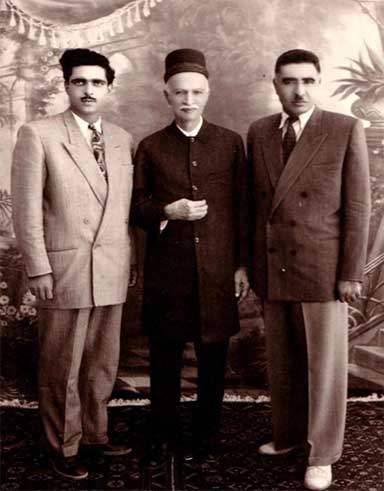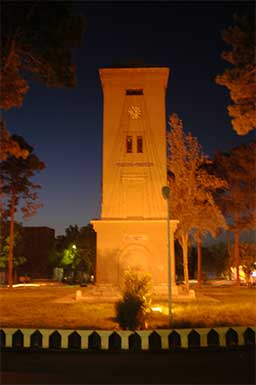|
Last week I was cataloging
books that were donated to the Zoroastrian Association of Houston library.
It is not an easy process as I tend to browse through the books too much.
I had to stop to read a slim memorial volume on Peshotanji Marker. There
are many lessons to be learned by reading about these wonderful pioneers
of our community whose foresight and dedication have contributed to what
we are and who we are today.
Peshotanji Dossabhai Marker 1871-1965
(excerpted from Memorial Volume on Peshotanji Marker by Mirza Sarosh
Lohrasp et al)
 |
|
Peshotan Marker in
the middle, Dr. Ra'ees Bahrami on the left and Mirza Soroush Lohrasb
on the right, 1949. Photo
courtesy of
www.oshihan.org |
The name of Peshotanji (Pestonji)
Dossabhai Marker has been written in gold in the annals of the
Zarathushtis of Iran. A simple, modest and self-effacing man, he won the
love and respect of his co-religionist on account of his single minded
devotion to the cause of Zarathushtis both in Iran and India.
Born in India in 1871, he
was educated at the Bombay Elphinstone College. He started his career
working in a solicitor's office but found being an independent businessman
suited him better. Business was however a means to an end. He started his
philanthropic work in Vesu, a small village in Surat district where he
established a school in 1916. He placed great emphasis on education and
asked that religious knowledge be part of the daily lessons for the
students. In addition, he donated funds for the maintenance of wells and
tanks in Vesu and provided for a medical officer to look after the health
of the Parsis there.
Pestonji Marker learnt
about the deplorable conditions of Zarathushtis in Iran during the times
of the Kajar regime. There were reports from Manekji Limjee Hataria and
also personal accounts of hardship that Irani Zarathushti immigrants who
had decided to come to Bombay. The persecution of Zarathushtis in Iran
deeply disturbed him. As a firm believer that education was the means of
uplifting the poor and ignorant and down-trodden, he decided to open an
educational institution in Yazd. He started with an orphanage for
Zarathushti boys and later on a Boy's High School was established for all
the students in Iran. Later on he realized that the community would never
come into its own if women remained ignorant. So he opened a Girls' High
school at Yazd where girls were given an education as well as trained in
handicrafts.
Pestonji Marker made it a
point to visit Iran several times to watch the progress of his
institutions. Each visit was memorable as there were large gatherings and
celebrations to honor him. Leading Government officials present along with
prominent Zarathushtis such as Arbab Kaikhushro Shahrokh, Ardeshir Edulji
Reporter were amongst those that met him. There were welcome parties that
met him several miles outside of the cities of Kerman, Shiraz, Isfahan and
Tehran. It is said that when he visited Yazd, the students of the
orphanage met him 40 miles from Yazd where he was garlanded and was taken
around the city in a huge procession. It was during one of his visits in
1924, he visited Persepolis and a jashan ceremony was held in the ancient
ruins. After centuries the ruins reverberated with the sound of Avestan
prayers.
The Iranian government was
not slow in recognizing the unique services rendered by Marker to uplift
and enlighten their people. On one of these visits to Iran, in 1949, that
he received the insignia of the Neshan-e-Elmi, and Neshan-e-Sepas. Later
that year he received the Nishan-e- Humayun in Bombay. His list of
charities in Bombay and Iran was long in both places and it clearly
indicated his interest in the welfare of the Zarathushti community. High
on the list was education and scholarships in pursuit of religious
knowledge but darb-e-mehrs, health facilities and religious literature
fund was also included.
 |
|
A circle with clock tower in Yazd, Iran
is named after Marker for his service to its Zarathushti community. |
No account of Pestonji
Marker would be complete without reference to Saroosh Lohrasb, the
principal of the Marker Orphanage. As a young graduate of the American
College in Tehran, Saroosh would have easily got a high paying job in
industry or administration. Instead, on the persuasion of Arbab Shahrokh,
he went to Yazd and served the school community for 30 years. Pestonji and
Saroosh had a wonderful relationship and they worked together to uplift
and betterment of the Irani Zarathushti.
To commemorate his memory,
the alumni of the Marker school thought a memorial volume with a brief
biography of Pestonji Marker, some aspects of ancient Iran and salient
features of Zarathushtra's teaching would be a tribute to this great man.
And it is a fitting tribute to him indeed!
An added note for members
of our list – Ambassador Jamsheed Marker's grandfather Ardeshir Marker and
Pestonji Marker were brothers.
And sources tell me the
Marker orphanage is not in operation anymore. There is an effort to
restore the building and complex. However, there is a tower in Yazd that
is still named after Pestonji Marker. |